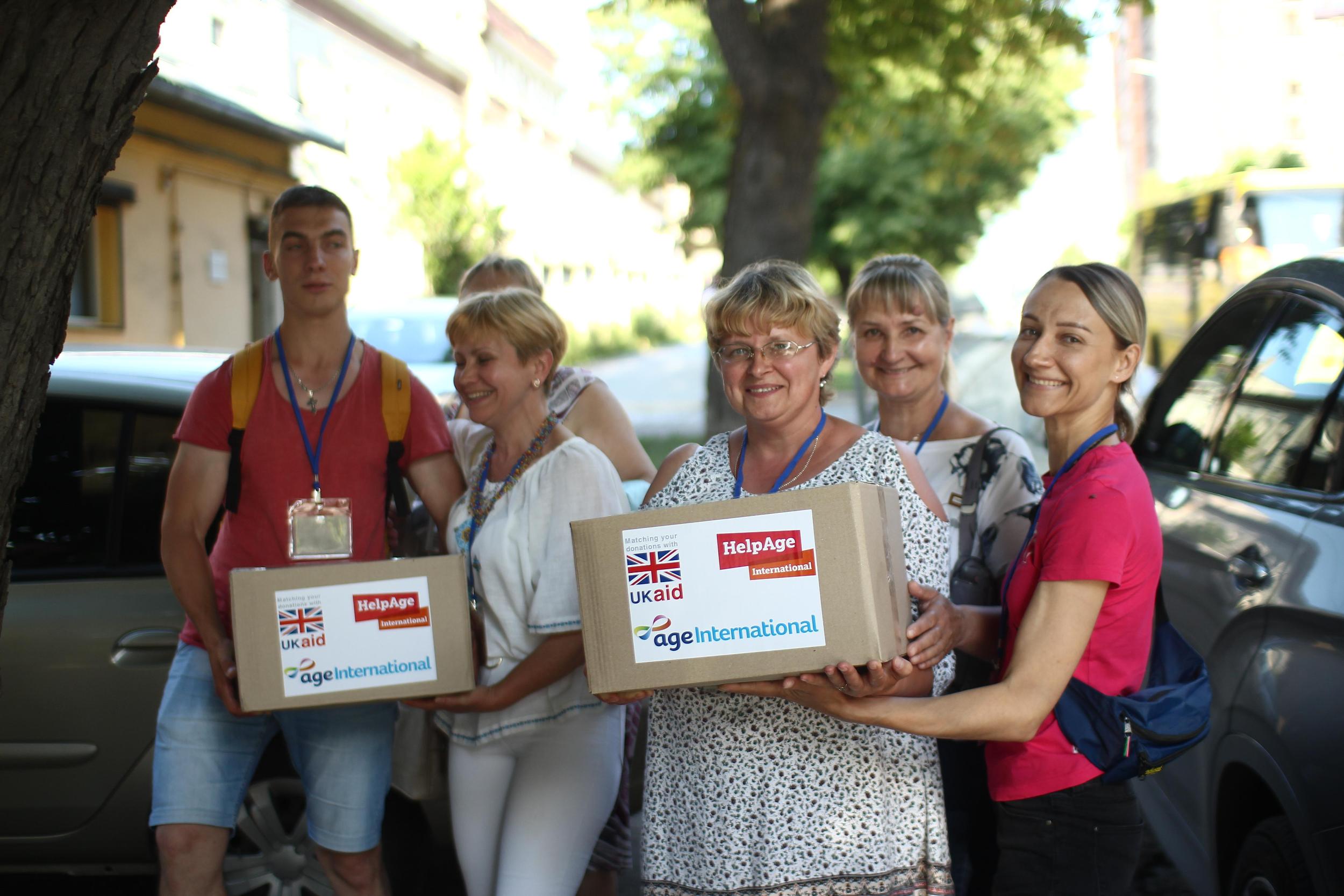As the war continues, HelpAge International’s country director in Ukraine Akbar Nazriev shares his insights on how things have changed and what life is like living under the ongoing threat of attack.

HelpAge International volunteers delivering humanitarian aid in Ukraine.
For people in eastern Ukraine, life was hard before February, having endured eight years of hostilities with Russia.
The local economy was broken and young people had left to find work, leaving older people to fend for themselves.
One in three people affected by the conflict was over-60. From Sloviansk, HelpAge International supported older people within five km from the contact line, which separated people living in government and non-government-controlled areas of eastern Ukraine. Through the support of 250 local volunteers, we provided food, healthcare and psychosocial support to older people living alone in an area where the risk of shelling and the outbreak of hostilities loomed.
The longer range of the missiles now means large-scale humanitarian assistance can only safely reach those living 40 km away from the contact line. It is only because of our smaller response, relationships with communities and our network of local volunteers that we can still get to within five kms, so long as extra safety protocols are followed.
Safety is the biggest priority, balanced with the urgency to provide assistance. Every time I give permission for staff to travel to different areas, there is a weight of responsibility to ensure they return home safely.
Before, we had a rule that if any shelling was heard, all staff returned to the office immediately. Now, with it happening so much more, judgements are made on different criteria. When two security colleagues travelled further east, they called to tell me they could hear shelling but that it was safe because it was far away. Even so, every hour I was sending messages to check they were OK, going through maps, tracking where they were, finding it hard to concentrate on anything else.
In Dnipro, shelling has become more frequent. We hear explosions and our windows shake as the Ukraine air defence system captures missiles over the city. The other Saturday, the critical civil infrastructure in Dnipro was targeted, one km away from where I was staying. There was a huge blast and everything shook.
There is a risk either way, whether you are on the frontline, or in a major city further away. One friend said she had felt safer in Kabul and in one sense of course she did: they didn’t have missiles there.
But you get used to it. There is a normalisation with shelling, air raid warnings and going to shelters late in the night.
The determined Ukrainian spirit continues, and more areas are being altered by the international influences that the humanitarian workers bring from around the world. This was evident in cities like Sloviansk, Mariupol and Severodonetsk before, but has become more widespread.
My recent visit to Kryvyi Rih, south-west of Dnipro reminded me again of this.
There was shelling nearby and the contact line is only 50 km away. Yet the local population comes and goes, leading a normal life. They are working, walking, drinking coffee, chatting, living alongside humanitarian workers – even becoming part of the humanitarian response themselves.
One local man I met set up an NGO a few months ago and bought a building from a kindergarten. Every room has different activities to support all ages including older people, like pottery classes, dancing and music. With so many other people leaving, he has managed to buy another four-storey building relatively cheaply to shelter displaced people and help distribute humanitarian items.
Another NGO rents a three-story building that used to be a hotel and now has 180 beds for displaced people. Before the war the organisation helped people with drug or alcohol addiction. When the war started the staff told them they could either work as part of the team or leave. Everyone stayed and provided support, while continuing with their recovery.
One older woman I met there told me she had lived alone in her basement in Avdiivka, a main city in Donetsk Oblast before. She now sees a nurse, has company and eats three meals a day. In the kitchen, three older people were chatting while scrubbing potatoes to help make lunch for everyone. There were about 60 people staying when I visited, but there is capacity for 180. There is also a basement that can be used as a shelter and contains two weeks of food supplies and water, as well as an electric generator.
You can see the badness but also the goodness of people in times of war. It’s an honour to be able to directly help people affected, but it helps to remember that the bad also makes good things happen, even in the hardest of times.
By Akbar Nazriev, Country Director, HelpAge International in Ukraine
